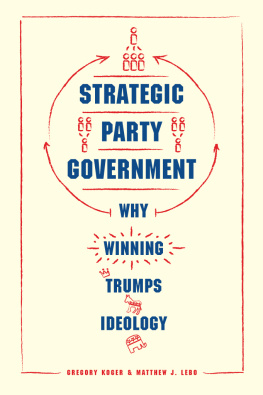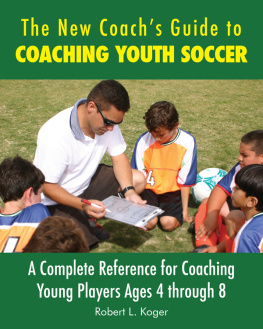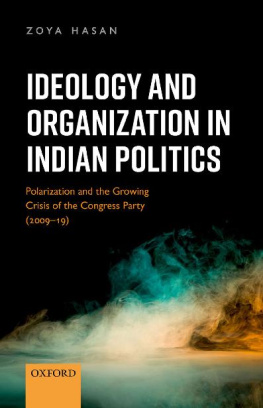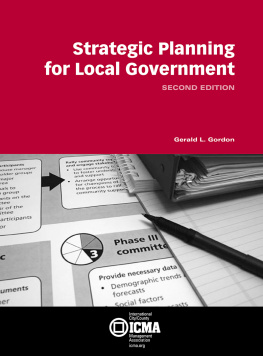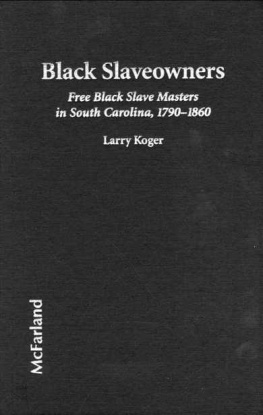Strategic Party Government
Chicago Studies in American Politics
A SERIES EDITED BY BENJAMIN I. PAGE, SUSAN HERBST, LAWRENCE R. JACOBS, AND ADAM J. BERINSKY
Also in the series:
THE POLITICS OF RESENTMENT: RURAL CONSCIOUSNESS IN WISCONSIN AND THE RISE OF SCOTT WALKER by Katherine J. Cramer
POST-RACIAL OR MOST-RACIAL? RACE AND POLITICS IN THE OBAMA ERA by Michael Tesler
LEGISLATING IN THE DARK: INFORMATION AND POWER IN THE HOUSE OF REPRESENTATIVES by James M. Curry
WHY WASHINGTON WONT WORK: POLARIZATION, POLITICAL TRUST, AND THE GOVERNING CRISIS by Marc J. Hetherington and Thomas J. Rudolph
WHO GOVERNS? PRESIDENTS, PUBLIC OPINION, AND MANIPULATION by James N. Druckman and Lawrence R. Jacobs
TRAPPED IN AMERICAS SAFETY NET: ONE FAMILYS STRUGGLE by Andrea Louise Campbell
ARRESTING CITIZENSHIP: THE DEMOCRATIC CONSEQUENCES OF AMERICAN CRIME CONTROL by Amy E. Lerman and Vesla M. Weaver
HOW THE STATES SHAPED THE NATION: AMERICAN ELECTORAL INSTITUTIONS AND VOTER TURNOUT, 19202000 by Melanie Jean Springer
THE AMERICAN WARFARE STATE: THE DOMESTIC POLITICS OF MILITARY SPENDING by Rebecca U. Thorpe
CHANGING MINDS OR CHANGING CHANNELS? PARTISAN NEWS IN AN AGE OF CHOICE by Kevin Arceneaux and Martin Johnson
TRADING DEMOCRACY FOR JUSTICE: CRIMINAL CONVICTIONS AND THE DECLINE OF NEIGHBORHOOD POLITICAL PARTICIPATION by Traci Burch
WHITE-COLLAR GOVERNMENT: THE HIDDEN ROLE OF CLASS IN ECONOMIC POLICY MAKING by Nicholas Carnes
HOW PARTISAN MEDIA POLARIZE AMERICA by Matthew Levendusky
THE POLITICS OF BELONGING: RACE, PUBLIC OPINION, AND IMMIGRATION by Natalie Masuoka and Jane Junn
POLITICAL TONE: HOW LEADERS TALK AND WHY by Roderick P. Hart, Jay P. Childers, and Colene J. Lind
THE TIMELINE OF PRESIDENTIAL ELECTIONS: HOW CAMPAIGNS DO (AND DO NOT) MATTER by Robert S. Erikson and Christopher Wlezien
LEARNING WHILE GOVERNING: EXPERTISE AND ACCOUNTABILITY IN THE EXECUTIVE BRANCH by Sean Gailmard and John W. Patty
ELECTING JUDGES: THE SURPRISING EFFECTS OF CAMPAIGNING ON JUDICIAL LEGITIMACY by James L. Gibson
FOLLOW THE LEADER? HOW VOTERS RESPOND TO POLITICIANS POLICIES AND PERFORMANCE by Gabriel S. Lenz
THE SOCIAL CITIZEN: PEER NETWORKS AND POLITICAL BEHAVIOR by Betsy Sinclair
THE SUBMERGED STATE: HOW INVISIBLE GOVERNMENT POLICIES UNDERMINE AMERICAN DEMOCRACY by Suzanne Mettler
DISCIPLINING THE POOR: NEOLIBERAL PATERNALISM AND THE PERSISTENT POWER OF RACE by Joe Soss, Richard C. Fording, and Sanford F. Schram
WHY PARTIES? A SECOND LOOK by John H. Aldrich
NEWS THAT MATTERS: TELEVISION AND AMERICAN OPINION, UPDATED EDITION by Shanto Iyengar and Donald R. Kinder
SELLING FEAR: COUNTERTERRORISM, THE MEDIA, AND PUBLIC OPINION by Brigitte L. Nacos, Yaeli Bloch-Elkon, and Robert Y. Shapiro
OBAMAS RACE: THE 2008 ELECTION AND THE DREAM OF A POST-RACIAL AMERICA by Michael Tesler and David O. Sears
FILIBUSTERING: A POLITICAL HISTORY OF OBSTRUCTION IN THE HOUSE AND SENATE by Gregory Koger
IN TIME OF WAR: UNDERSTANDING AMERICAN PUBLIC OPINION FROM WORLD WAR II TO IRAQ by Adam J. Berinsky
US AGAINST THEM: ETHNOCENTRIC FOUNDATIONS OF AMERICAN OPINION by Donald R. Kinder and Cindy D. Kam
THE PARTISAN SORT: HOW LIBERALS BECAME DEMOCRATS AND CONSERVATIVES BECAME REPUBLICANS by Matthew Levendusky
DEMOCRACY AT RISK: HOW TERRORIST THREATS AFFECT THE PUBLIC by Jennifer L. Merolla and Elizabeth J. Zechmeister
AGENDAS AND INSTABILITY IN AMERICAN POLITICS, SECOND EDITION by Frank R. Baumgartner and Bryan D. Jones
THE PRIVATE ABUSE OF THE PUBLIC INTEREST by Lawrence D. Brown and Lawrence R. Jacobs
THE PARTY DECIDES: PRESIDENTIAL NOMINATIONS BEFORE AND AFTER REFORM by Marty Cohen, David Karol, Hans Noel, and John Zaller
SAME SEX, DIFFERENT POLITICS: SUCCESS AND FAILURE IN THE STRUGGLES OVER GAY RIGHTS by Gary Mucciaroni
Strategic Party Government
Why Winning Trumps Ideology
GREGORY KOGER
MATTHEW J. LEBO
THE UNIVERSITY OF CHICAGO PRESS CHICAGO AND LONDON
The University of Chicago Press, Chicago 60637
The University of Chicago Press, Ltd., London
2017 by The University of Chicago
All rights reserved. Published 2017.
Printed in the United States of America
26 25 24 23 22 21 20 19 18 17 1 2 3 4 5
ISBN-13: 978-0-226-42457-6 (cloth)
ISBN-13: 978-0-226-42460-6 (paper)
ISBN-13: 978-0-226-42474-3 (e-book)
DOI: 10.7208/chicago/9780226424743.001.0001
Library of Congress Cataloging-in-Publication Data
Names: Koger, Gregory, author. | Lebo, Matthew J., author.
Title: Strategic party government : why winning trumps ideology / Gregory Koger and Matthew J. Lebo.
Other titles: Chicago studies in American politics.
Description: Chicago ; London : The University of Chicago Press, 2016. | Series: Chicago studies in American politics.
Identifiers: LCCN 2016024713 | ISBN 9780226424576 (cloth : alk. paper) | ISBN 9780226424606 (pbk. : alk. paper) | ISBN 9780226424743 (e-book)
Subjects: LCSH: Political partiesUnited States. | United StatesPolitics and government2009
Classification: LCC JK2265 .K644 2016 | DDC 328.73/0769dc23 LC record available at https://lccn.loc.gov/2016024713

This paper meets the requirements of ANSI/NISO Z39.481992 (Permanence of Paper).
TO OUR FATHERS, JOHN WILLIAM KOGER AND HERSCHEL WILFRED LEBO
Contents
This book provides a new chapter in a classic conversation. One of the very first political science books, Woodrow Wilsons Congressional Government, lamented the weak state of parties in the House and Senate compared to the British House of Commons. From 1885 to 2016, scholars have understood that legislators determine the role of parties in their chambers and that their choices vary over time and across chambers.
Over the last forty years, there has been a robust conversation about congressional parties as scholars have tried to understand the forces at work in Congress. This book builds on the work of neoinstitutionalist scholars like Barbara Sinclair, John Aldrich, David Rohde, Keith Krehbiel, Gary Cox, and Mat McCubbins. Like these leading scholars, we seek to provide an account of varying party influence grounded in legislators goals and strategies. We emphasize the role of electoral competition and strategic interaction to explain why legislators will cooperate with their party leaders even when they disagree with each other on policy issues.
Our account benefits from our colleagues research, but also from the last ten years of congressional partisanship. While scholars were debating whether parties matter, the US Congress became increasingly partisan and an ever-increasing share of legislators attention has been focused on helping their party succeed in the next election. This partisan competition is the game we set out to explain, but with an account that also explains how and why legislative parties change over time. Our initial insight was to apply new time series techniques to classic measures of congressional partisanship, which led to a new model of congressional parties and fresh ideas to test.
This project has had a long incubation period. Our partnership began over umbrella drinks at Trader Vics in the Palmer House Hilton and has carried us across the country. Along the way, we have accumulated a vast number of debts. First, we appreciate the scholars who have coauthored chapters of this book: Jamie Carson, Ellen Key, and Everett Young. Our unindicted coauthor is Ben Bishin, who introduced us, has been a most generous commenter on this manuscript, and has been a great friend and colleague throughout the process. We also appreciate the research assistance of Marie Courtemanche, Justine DElia, Taylor Grant, April Johnson, Maxwell Mak, Adam McGlynn, Andrew OGeen, David Perkins, Andrew Sidman, Claire Catotti, and Chris Weber. Among the many scholars who have provided comments, we especially appreciate Kathleen Bawn, Hans Noel, Gary Cox, Jeff Jenkins, Nate Monroe, Arthur Lupia, Chris den Hartog, Justin Buchler, Jeff Grynaviski, Gary Jacobson, Laurel Harbridge, Phil Paolino, Doug Roscoe, Stanley Feldman, and seminar audiences at Yale, Ohio State University, Washington University, the University of Georgia, Texas A&M, the University of Miami, Stony Brook University, and miniconferences hosted by UWWisconsin, Duke (Senate parties), and an Empirical Implications of Theoretical Models (EITM) miniconference at the June 2005 Canadian Political Science Association meeting in London, Ontario. We especially appreciate John Aldrich, David Rohde, and the Political Institutions and Public Choice Program at Duke University for hosting us for a seminar and book discussion. All remaining errors are our own, except for those attributable to Hans Noel.
 This paper meets the requirements of ANSI/NISO Z39.481992 (Permanence of Paper).
This paper meets the requirements of ANSI/NISO Z39.481992 (Permanence of Paper).
